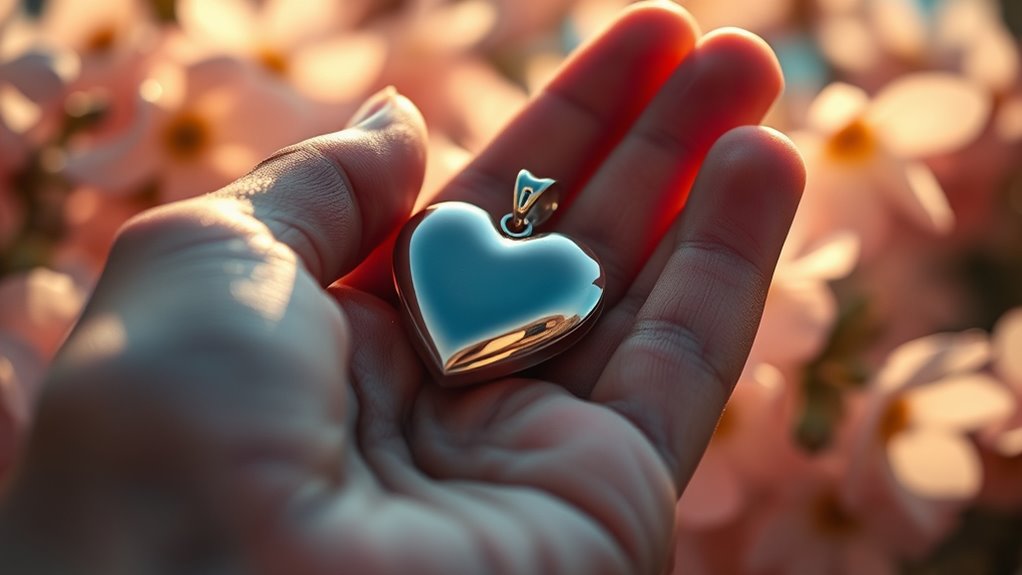If you’re in love with the idea of being loved rather than the person itself, you might focus more on emotional highs, butterflies, or future dreams than genuine connection. You may idealize your partner, overlook red flags, or chase feelings instead of getting to know who they truly are. Your happiness could depend on validation and excitement rather than authentic bonds. Keep exploring, and you’ll uncover the true signs behind this pattern.
Key Takeaways
- Prioritizing emotional highs and butterflies over understanding the partner’s true character.
- Creating idealized fantasies that overlook flaws, leading to disappointment.
- Ignoring red flags and gut feelings due to infatuation and obsession with being in love.
- Focusing on future possibilities instead of building genuine present connection.
- Relying on partner’s validation for happiness rather than developing self-awareness and independence.

Sometimes, it’s easy to get caught up in the excitement of a new attraction, but if you find yourself more focused on how you feel than on who the person truly is, you might be chasing feelings instead of a genuine connection. You might notice yourself obsessing over the butterflies, the rush of anticipation, or the idea of being loved rather than really getting to know the person behind those feelings. When you prioritize the emotional high over the person’s true character, you’re more interested in the thrill than in building something real.
You may find yourself idealizing the person, creating an image that fits what you want rather than who they really are. Instead of appreciating their flaws, quirks, and unique qualities, you put them on a pedestal because it feeds your fantasy of love. This often leads to disappointment when reality reveals that they’re not perfect or don’t match your expectations. If you catch yourself ignoring red flags or dismissing your gut feelings because you’re too enamored with the idea of being in love, that’s a sign you’re chasing feelings rather than a person.
Idealizing someone creates a fantasy, leading to disappointment when reality doesn’t match your expectations.
Another indication is if you’re more focused on the idea of being in a relationship than on the actual person. You might be excited about the status, the romance, or the social validation that comes with being loved, rather than genuinely caring about who they are and what they want. You may also find yourself trying to impress or shape the other person into what you think love should look like, rather than accepting them as they are. This can create a mismatch where you’re more invested in the concept of love than in the real, imperfect individual across from you.
You might also notice that you’re more interested in the future you envision with them than in the present moment. Dreaming about a life together, imagining marriage or children, can sometimes distract you from truly understanding who they are now. If your focus is on what could be rather than what is, you’re probably chasing feelings of potential rather than forming a genuine bond. Additionally, this future-oriented mindset can cause you to overlook the importance of genuine compatibility and emotional connection in the present. Recognizing the difference between genuine connection and superficial attraction can help you stay grounded in reality.
Finally, if your happiness feels dependent on their validation or affection, it’s a clear sign you’re more in love with the idea of being loved than with them as a person. When your emotional well-being hinges on feeling desired or cared for, it’s easy to lose sight of whether the relationship is truly healthy or rooted in mutual understanding. Recognizing these signs can help you step back and evaluate whether you’re pursuing real connection or just the fleeting rush of feelings. Moreover, cultivating self-awareness and understanding your motives can support healthier relationship choices and prevent emotional dependency.
Frequently Asked Questions
How Can I Distinguish Between Genuine Love and Infatuation?
To distinguish genuine love from infatuation, pay attention to your feelings over time. If your attachment deepens with understanding and acceptance of the person’s flaws, it’s genuine love. But if your feelings are fleeting, based mainly on excitement or idealization, you’re likely infatuated. Ask yourself if you value the person for who they truly are or just for how they make you feel. True love grows, infatuation fades.
Can Chasing Feelings Be Harmful to My Emotional Health?
Chasing feelings can harm your emotional health because it keeps you focused on fleeting emotions instead of real connection. You might find yourself constantly seeking validation or excitement, which can lead to disappointment and emotional exhaustion. Instead, try to prioritize genuine relationships based on trust and understanding. This shift helps you build stability and self-awareness, reducing the risk of emotional burnout caused by chasing temporary highs.
What Are Common Signs I’M More in Love With the Idea Than a Person?
When you’re more in love with the idea than a person, it’s like chasing rainbows—you’re after something that might never truly exist. You might find yourself fantasizing about perfect scenarios, ignoring red flags, or feeling excited without genuine connection. If your happiness depends solely on the idea of love rather than real interactions, you’re likely more in love with the concept than the person. Recognize these signs to protect your heart.
How Do I Stop Romanticizing the Wrong Feelings?
To stop romanticizing the wrong feelings, start by recognizing when your thoughts are idealized or based on fantasies rather than reality. Challenge those illusions by asking yourself if your feelings are about the person or just the idea of love. Focus on genuine interactions and qualities that truly matter. Practice mindfulness and self-awareness, and give yourself space to see the person for who they really are, not just what you want them to be.
When Should I Seek Help for Obsessive Feelings?
Imagine your feelings as a storm cloud gathering overhead. When obsessive thoughts start to flood your mind, making it hard to see clearly or function normally, it’s time to seek help. If these feelings cause anxiety, disrupt your daily life, or make you feel trapped, don’t wait. Reaching out to a mental health professional can help clear the storm and bring back your peace and clarity.
Conclusion
Remember Sarah’s story—she loved the idea of love so much she kept chasing fleeting butterflies, never realizing she was missing the real person underneath. Like chasing the mirage of water in a desert, chasing feelings can leave you dehydrated and empty. If you find yourself more enamored with the fantasy than the reality, it’s time to pause and ask if you’re truly connecting or just chasing an illusion. Genuine love requires seeing someone for who they are, not just what feelings they evoke.









